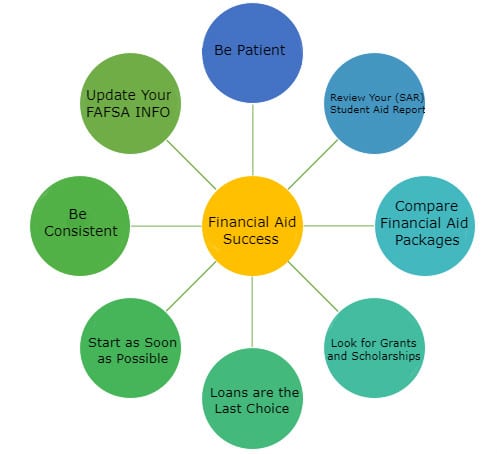How to get Financial Aid Successfully and Efficiently
There is a FAFSA forecaster that helps you get an idea of what students will get in terms of aid. Just remember it is a student aid forecast not a direct quote of your amount of aid.
The Financial Aid Process
1 – Complete the Free Application for Federal Student Aid (FAFSA)
2 – Review Your Student Aid Report (SAR)
3 – Compare Your Financial Aid Packages
4 – Maximize Grants and Scholarships Before Applying for Student Loans
5 – Compare Federal and Private Student Loans
If you follow these steps when you state your process, you are destined to get as successful of an aid package as you can get. It is not a perfect process but if you stay organized and patient you can get what you deserve in terms of your financial eligibility. If you are looking at more information from the government about the entire financial aid process see the federal student aid section of the US Department of Education website.
Our Interview with a Financial Aid Specialist
Hopefully these questions and answers can give keen insight to what it takes to have a successful financial aid process. Along that path to successful financing of your education, you can also avoid making the same mistakes thousands of others have made before you at schools all across the country.
What is the most important thing a student can do before they go to the financial aid office for the first time?
– Read all emails, write down the questions they have, provide all pertinent financial aid information requested.
What is the most common mistake made by students when it comes to financial aid? Or what can they improve on to make their experience better?
– I have attached a common errors flyer for you to review. Best improvements is to thoroughly review and read all communications sent to them by the Financial Aid Office. Don’t wait till the last minute to complete financial aid files and enroll for classes. Be sure to let the Financial Aid Office know if you have attended other colleges.
Does it help to be patient in the process or is it better to be more assertive?
– Be patient. Financial Aid is a process and it does take time to complete. Apply for financial aid early don’t try to rush the process.
If you could control all students totally, what would you have them do in terms of the financial aid process?
– I would have all students fill out the FAFSA and complete all required documentation and enroll for classes by the priority processing deadlines.
If a student does not apply for financial aid this year, will that affect their eligibility for financial aid in subsequent years?
– No
Do scholarships effect financial aid packages for individual students?
– The Financial Aid Office is required to look at all aid received and it may reduce the need for a student to borrow. Most Financial Aid Offices highly encourage scholarships because they do not need to be repaid with interest.
If the financial aid is insufficient or a student’s circumstances have changed, how do they appeal for more financial aid?
– Yes, a student can apply for Special Conditions if they or their parent’s income for 2017 is less than 2016 due to the loss of a job, death of a parent or spouse, divorce, high medical expenses, or a similar situation. When all else fails, make an appointment with the financial aid office to go over their file.
Is it common for any terms and conditions to be included in financial aid packages?
– Yes, it’s required to ensure all students understand their financial aid award packets.
Is it common for schools to have leftover financial aid and how can students best go about getting access to it?
– No, most schools award all aid that is available to eligible students.
Can you explain if and when a parent’s income is considered in terms of a particular student’s financial aid package?
– If you answer “No” to each of these questions you will need your parents income on the FAFSA:
• Were you born before Jan. 1, 1994?
• Will you be working on a master or doctorate degree?
• As of today, are you married?
• Do you have children who receive more than half of their support from you?
• Do you have dependents (other than your children or spouse) who live with you and who receive more than half of their support from you, now and through June 30, 2018?
• Are both of your parents deceased, or are you or were you (until age 18) a ward/dependent of the court?
• Are you a veteran of the U.S. Armed Forces?
Common Mistakes to Avoid in the Process
It is very similar to the home financing process, where each delay (for example a tax form) can cause to transaction to delay. Constant communication and awareness will go a long way and keep the process moving towards the end goal. Which is financing your education. Below we cover the mistakes in detail.
Maintain and Secure Username/Password
Keep your FSA ID in a safe place. Forgetting your username and password can cause delays.
Keep Personal information up to Date
Always update your personal information, such as your name, address, email, etc.
First Bachelor’s Degree
“Will you have your first Bachelor’s Degree before you begin the current FAFSA school year?”
You only Answer YES to this if you have the credits needed to complete your Bachelor’s Degree by the date you complete your FAFSA.
Incorrect # of Years in College
“What will your college grade level be when you begin the individual FAFSA school year.”
Only answer 7 (Graduate/Professional) for instance, if you are working towards a doctorate level degree.
Incorrect Income Year
Make sure you are using the correct tax forms, etc. to answer the income questions.
Incorrect Number in Household/Number in College
Do not count others in your household unless you support them at least 51 percent or more during the individual FAFSA year. Dependent students also need to count others in household size that parents support more than 51 percent of the FAFSA school year. This does not and cannot include any boyfriend/girlfriend or even fiancés.
Incorrect Dependent Status
Dependent students cannot count parents as ‘in college.’ Running Start or elective high school students are not counted as ‘in college’ either.
Forgetting Your School’s Code
Do not forget to use your individual school code
Electronic Signature
Forgetting to submit your E-signature will hold up your application.
Follow instructions on FAFSA or ask for help from our office if you are unsure about any of these steps.


